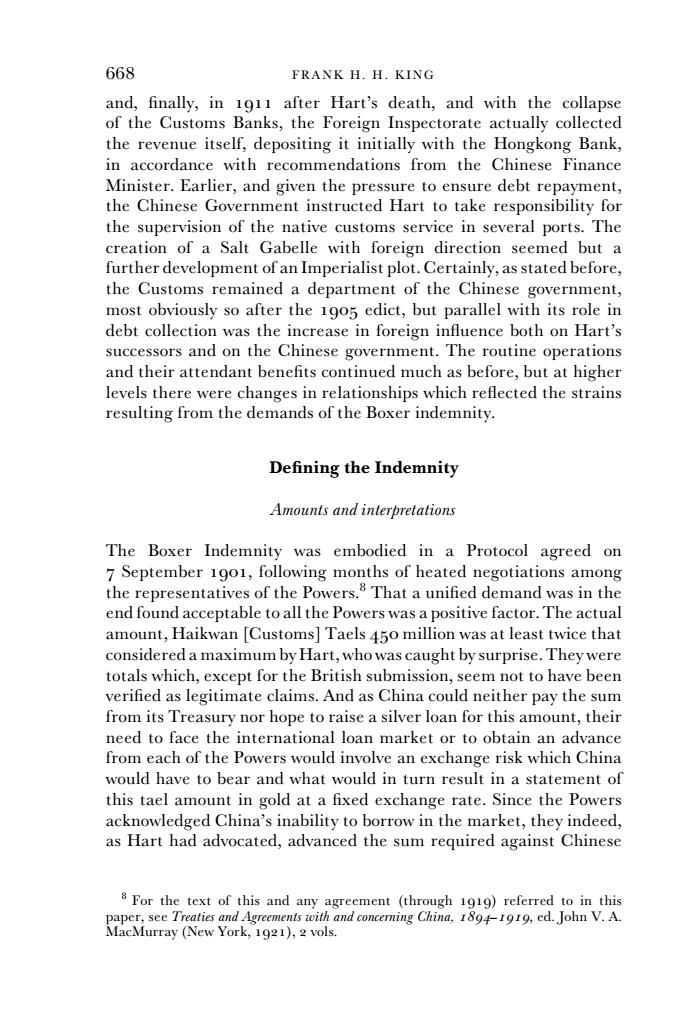正在加载图片...

668 FRANK H.H.KING and,finally,in 1911 after Hart's death,and with the collapse of the Customs Banks,the Foreign Inspectorate actually collected the revenue itself,depositing it initially with the Hongkong Bank, in accordance with recommendations from the Chinese Finance Minister.Earlier,and given the pressure to ensure debt repayment, the Chinese Government instructed Hart to take responsibility for the supervision of the native customs service in several ports.The creation of a Salt Gabelle with foreign direction seemed but a further development of an Imperialist plot.Certainly,as stated before, the Customs remained a department of the Chinese government, most obviously so after the 1905 edict,but parallel with its role in debt collection was the increase in foreign influence both on Hart's successors and on the Chinese government.The routine operations and their attendant benefits continued much as before,but at higher levels there were changes in relationships which reflected the strains resulting from the demands of the Boxer indemnity. Defining the Indemnity Amounts and interpretations The Boxer Indemnity was embodied in a Protocol agreed on 7 September 1901,following months of heated negotiations among the representatives of the Powers.That a unified demand was in the end found acceptable to all the Powers was a positive factor.The actual amount,Haikwan [Customs]Taels 450 million was at least twice that considered a maximum by Hart,who was caught by surprise.They were totals which,except for the British submission,seem not to have been verified as legitimate claims.And as China could neither pay the sum from its Treasury nor hope to raise a silver loan for this amount,their need to face the international loan market or to obtain an advance from each of the Powers would involve an exchange risk which China would have to bear and what would in turn result in a statement of this tael amount in gold at a fixed exchange rate.Since the Powers acknowledged China's inability to borrow in the market,they indeed, as Hart had advocated,advanced the sum required against Chinese 8 For the text of this and any agreement (through 1919)referred to in this paper,see Treaties and Agreements with and concerning China,1894-1919,ed.John V.A. MacMurray (New York,1921),2 vols.668 FRANK H. H. KING and, finally, in 1911 after Hart’s death, and with the collapse of the Customs Banks, the Foreign Inspectorate actually collected the revenue itself, depositing it initially with the Hongkong Bank, in accordance with recommendations from the Chinese Finance Minister. Earlier, and given the pressure to ensure debt repayment, the Chinese Government instructed Hart to take responsibility for the supervision of the native customs service in several ports. The creation of a Salt Gabelle with foreign direction seemed but a further development of an Imperialist plot. Certainly, as stated before, the Customs remained a department of the Chinese government, most obviously so after the 1905 edict, but parallel with its role in debt collection was the increase in foreign influence both on Hart’s successors and on the Chinese government. The routine operations and their attendant benefits continued much as before, but at higher levels there were changes in relationships which reflected the strains resulting from the demands of the Boxer indemnity. Defining the Indemnity Amounts and interpretations The Boxer Indemnity was embodied in a Protocol agreed on 7 September 1901, following months of heated negotiations among the representatives of the Powers.8 That a unified demand was in the end found acceptable to all the Powers was a positive factor. The actual amount, Haikwan [Customs] Taels 450 million was at least twice that considered a maximum by Hart, who was caught by surprise. They were totals which, except for the British submission, seem not to have been verified as legitimate claims. And as China could neither pay the sum from its Treasury nor hope to raise a silver loan for this amount, their need to face the international loan market or to obtain an advance from each of the Powers would involve an exchange risk which China would have to bear and what would in turn result in a statement of this tael amount in gold at a fixed exchange rate. Since the Powers acknowledged China’s inability to borrow in the market, they indeed, as Hart had advocated, advanced the sum required against Chinese 8 For the text of this and any agreement (through 1919) referred to in this paper, see Treaties and Agreements with and concerning China, 1894–1919, ed. John V. A. MacMurray (New York, 1921), 2 vols